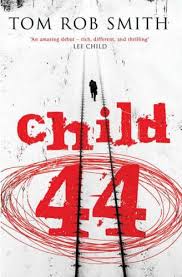
This debut novel by a young English author skilfully recreates the bleak and harsh days of Stalinist Russia. It also introduces an interesting new hero in crime fiction, Officer Leo Demidov, a committed cog in the communist machinery whose life is upturned by an epiphany.
It is Moscow, 1953. Leo Demidov is a fast rising star in the MGB (State Security Committee, later replaced by the KGB) and a man who passionately believes in the State and the oppressive measures it uses, to establish the ideals it stands for. He himself is a willing participant in these measures, arresting and torturing suspected spies and dissidents,often on flimsy evidence. And since crime is considered a capitalist failing caused by poverty, the Communist state must necessarily be projected as crime-free - another illusion he happily supports.Until the bodies of mutilated children begin appearing, he witnesses the murder of innocent citizens by his subordinate and starts to question his beliefs.
Then, even as he invites the wrath of his superiors, he begins investigating what he suspects is the work of a serial killer. Faced with opportunistic subordinates and a government eager to squash what it considers his anti-State activities, he quickly finds himself arrested, tortured and demoted. Yet he soldiers on, escaping murder attempts and deportation to a gulag until he finds his answers in a shocking finale, in a place far from Moscow yet closer to him than he realizes.
At one level, this book is about a hunt for a vicious killer. At another, it plots the slow unraveling of a man's faith in everything he has believed in - his employer, the society he has helped build, his wife's loyalties. As he is reduced to the state of the common man he once terrorized as a MGB officer, Demidov realizes the suffering he has helped cause. He also finds the most unlikely allies in his quest - fellow prisoners, his boss in the militia he is bumped down into, his own estranged wife.
It is also a chilling story of a villain far more vicious than the killer - the State itself. This is a terrifying world of paranoia, violated civil liberties and the repression of a whole nation by a regime focused on ideals it cannot really afford to realize. It is a society far from equal -even as the marginalized are left deprived and victimized, corruption and nepotism thrive in the creamy layer of government employees and aye-sayers. It is a society that, for all its talk of equal opportunities and the greater common good, is finally responsible for creating the killer, and all the other criminals it is so desperate to ignore.
I enjoyed the break neck speed at which the plot proceeds, and the minimal yet effective prose. This is a classic thriller - it opens with a bang, pops up dead bodies and red herrings with clockwork regularity, and moves ahead at a swift, action packed pace before ending with yet another bang. The murder of children is always a troubling subject - it unearths our own primeval fears about the evil and perversion that lies dormant in people. It is also always symbolic (atleast in fiction) of the perpetrator's own childhood, of some suffering he or she might have endured. So it's a given that, at some point, the reader is overwhelmed not by the atrocities committed by the villain, but an image of him/ her as a traumatized child. For all that, I was still unprepared for how things turned out here, for a climax that was at once sad and shocking.
The book ends with more than one hint of a sequel, so here's looking forward to more Demidov mysteries soon. And, quite probably, a movie version too.
I'm on a sort of Russia trip these days, if only as an armchair traveller - after Child 44, the two books I'm currently reading are connected to that fascinating region too. One is the terrific Strange Telescopes, that can only be described as anti-travel writing. The other is the English translation of the Russian scifi best seller, The Stranger. Both explore parallel realities, entire worlds existing out of the ordinary - much like the communist state of Child 44. And much like this novel, very, very unputdownable.
Watch this space!
It is Moscow, 1953. Leo Demidov is a fast rising star in the MGB (State Security Committee, later replaced by the KGB) and a man who passionately believes in the State and the oppressive measures it uses, to establish the ideals it stands for. He himself is a willing participant in these measures, arresting and torturing suspected spies and dissidents,often on flimsy evidence. And since crime is considered a capitalist failing caused by poverty, the Communist state must necessarily be projected as crime-free - another illusion he happily supports.Until the bodies of mutilated children begin appearing, he witnesses the murder of innocent citizens by his subordinate and starts to question his beliefs.
Then, even as he invites the wrath of his superiors, he begins investigating what he suspects is the work of a serial killer. Faced with opportunistic subordinates and a government eager to squash what it considers his anti-State activities, he quickly finds himself arrested, tortured and demoted. Yet he soldiers on, escaping murder attempts and deportation to a gulag until he finds his answers in a shocking finale, in a place far from Moscow yet closer to him than he realizes.
At one level, this book is about a hunt for a vicious killer. At another, it plots the slow unraveling of a man's faith in everything he has believed in - his employer, the society he has helped build, his wife's loyalties. As he is reduced to the state of the common man he once terrorized as a MGB officer, Demidov realizes the suffering he has helped cause. He also finds the most unlikely allies in his quest - fellow prisoners, his boss in the militia he is bumped down into, his own estranged wife.
It is also a chilling story of a villain far more vicious than the killer - the State itself. This is a terrifying world of paranoia, violated civil liberties and the repression of a whole nation by a regime focused on ideals it cannot really afford to realize. It is a society far from equal -even as the marginalized are left deprived and victimized, corruption and nepotism thrive in the creamy layer of government employees and aye-sayers. It is a society that, for all its talk of equal opportunities and the greater common good, is finally responsible for creating the killer, and all the other criminals it is so desperate to ignore.
I enjoyed the break neck speed at which the plot proceeds, and the minimal yet effective prose. This is a classic thriller - it opens with a bang, pops up dead bodies and red herrings with clockwork regularity, and moves ahead at a swift, action packed pace before ending with yet another bang. The murder of children is always a troubling subject - it unearths our own primeval fears about the evil and perversion that lies dormant in people. It is also always symbolic (atleast in fiction) of the perpetrator's own childhood, of some suffering he or she might have endured. So it's a given that, at some point, the reader is overwhelmed not by the atrocities committed by the villain, but an image of him/ her as a traumatized child. For all that, I was still unprepared for how things turned out here, for a climax that was at once sad and shocking.
The book ends with more than one hint of a sequel, so here's looking forward to more Demidov mysteries soon. And, quite probably, a movie version too.
I'm on a sort of Russia trip these days, if only as an armchair traveller - after Child 44, the two books I'm currently reading are connected to that fascinating region too. One is the terrific Strange Telescopes, that can only be described as anti-travel writing. The other is the English translation of the Russian scifi best seller, The Stranger. Both explore parallel realities, entire worlds existing out of the ordinary - much like the communist state of Child 44. And much like this novel, very, very unputdownable.
Watch this space!






No comments:
Post a Comment